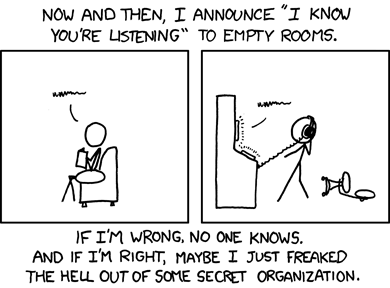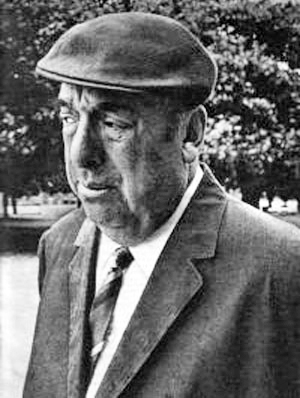A few days ago, my husband came home from getting his hair cut with a great 'do but otherwise looking a wee bit haggard. "What's wrong?" I asked.
"The woman who cut my hair never took a breath from the moment I sat down in the chair," he replied. "She was a living, breathing run-on sentence, and I'm exhausted."
Is it just my imagination, or are there more compulsive talkers than ever? We encounter them in practically every walk of life--at the grocery, the hairdresser, in waiting rooms (where one woman talked to me once even though I closed my eyes and fell asleep; I woke when they called my name and she was still talking!).
Not much cause-wise comes up in a Google search on the problem, though you'll find any number of names for it and the thinnest of coping advice. This takes the form of "stay on your toes," which is, of course, for the person being talked at and also works if you want to avoid walking off a cliff or being mauled by bears in the wild.
Imagine, then, how delighted I was to find an essay on listening I'd never heard of before by a writer I had. This Sunday I'll post a review about Brenda Ueland's
If You Want to Write. In searching the internet for a photo of her to accompany the article, I came across her essay "
The Art of Listening." Ueland died in 1985, so the essay was around long before compulsive talking hit my radar screen.
While Ueland tries to entice people into wanting to be better listeners--"because listening is a magnetic and strange thing, a creative force....When we are listened to, it creates us, makes us unfold and expand. Ideas actually begin to grow within us and come to life."--she also presents both sides of the problem. "Now, there are brilliant people who cannot listen much. They have no ingoing wires on their apparatus. They are entertaining, but exhausting, too."
She then relates how her father was one of those men, and because he always talked and never listened, she stopped trying to be heard, and so they never connected in his lifetime.
There's a lot of buzz these days about how we get tossed back to us in human relationships what we dish out. That's not completely untrue, but it seems to get pumped up to the point that it morphs into what it criticizes and manages to let everyone off the hook instead of making each of us more accountable.
After all, this way of thinking goes, the offended person must have induced the other's behavior some how.
Projection is the word attached to this. And while I don't deny the psychological definition and reality of projection, this other circumstance I'm describing is a bastardization of it.
While I will confess there are times I've contributed to someone else's bad behavior, too many to count in fact, there are also plenty of instances when someone was just plain rude and unconscious, and I had nothing to do with it except as witness. But what I think the people who preach about this sort of thing are trying to say is that sometimes there are things we can do to try to redirect the other person's energy. Staying on our toes, it turns out, is just the beginning:
Recently, a man I had not seen for 20 years wrote me. He was an unusually forceful man and had made a great deal of money. But he had lost his ability to listen. He talked rapidly and told wonderful stories and it was just fascinating to hear them. But when I spoke--restlessness: "Just hand me that, will you?...Where is my pipe?" It was just a habit. He read countless books and was eager to take in ideas, but he just could not listen to people. Well, this is what I did. I was more patient--I did not resist his non-listening talk as I did my father's. I listened and listened to him, not once pressing against him, even in thought, with my own self-assertion. I said to myself: 'He has been under a driving pressure for years....But now, by listening, I will pull it all out of him. He must talk freely and on and on. When he has been really listened to enough, he will grow tranquil. He will begin to want to hear me.
And he did, Ueland says, after a few days, at which point he began to ask
her questions and she neatly worked his listening problem into her answers. Two days of solid listening is no small feat, but Ueland saw the value in sticking with it. By listening, she says, she starts up another's "creative fountain" and that does them good.
Now why does it do them good? I have a kind of mystical notion about this. I think it is only by expressing all that is inside that purer and purer streams come. It is so in writing. You are taught in school to put down on paper only the bright things. Wrong. Pour out the dull things on paper too--you can tear them up afterward--for only then do the bright ones come. If you hold back the dull things, you are certain to hold back what is clear and beautiful and true and lively.
I'm a writer and a writing teacher, so I like how she pulled in the writing analogy. I also encounter compulsive talkers in my writing workshops. It's a natural draw. They come to writing because they want to be heard, finally. The paper or computer screen before them is blank, waiting to be filled, and it doesn't interrupt or talk back or expect them listen to
its story. It gives free reign, and these people are more than ready to take hold.
For my own part, I came to writing because it was something I was born to do, which is neither a greater nor a lesser calling; it was just always there. I was the kid who wrote a song when she was 7 and went around the house singing it into a hairbrush. When I was 9 and my fourth-grade teacher cast all the blue-eyed children in the class play, I wrote my own play in retaliation and cast brown-eyed friends. Then in the summer I was 10 I tried to rally the other kids who lived in my neighborhood to put on a play I was writing based on Cinderella.
Little did I know it then, when life gushed out around me on all sides, that one day I would suffer over rather than embrace the blankness of the page before me, unable to fill it, my stomach cramping at its sight. What I went through looked a little different than compulsive talking, but it too came from not being heard.
More precisely, it came from being silenced.
So I understand firsthand what it feels like to not be able to get out what you need to get out. But in a workshop setting, I have a roomful of people who all deserve a share of the airspace, and it's my responsibility to keep everyone engaged.
A person who's been silenced will heal herself as long as she feels safe and there's a space in which she can speak. Talkers, on the other hand, I approach by encouraging them to funnel all that energy onto the paper. Writing is a container. If the glass breaks it soaks the table and your clothes and the floor, and then someone slips and falls--well, you get it. There is energy in story, but too much talk
about the story blows it apart.
How to be a good listener
and a more focused writer follow along the same path. The stepping-off point for both is listening to
yourself--
The Little Surround of today's poem (see post below). Find a quiet place at the center where you hear what that person inside wants said....
..and then, of course, write it on that empty page.
It will do you good.











.jpg/445px-Virginia_Woolf_by_George_Charles_Beresford_(1902).jpg)